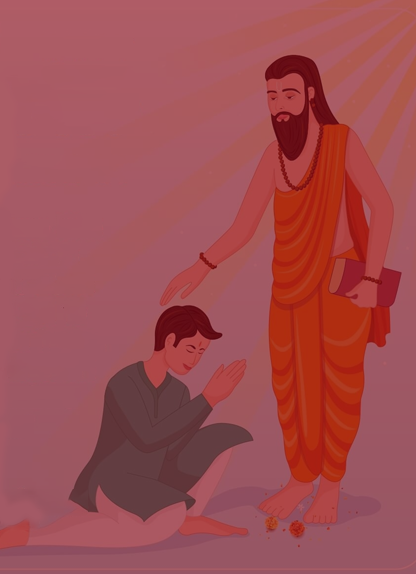Chapter VI-9. Let the Yogi, connected always with the self, remain in solitude, alone, with mind and body controlled, free from hope and longing for things.
Solitude is an inner state of being with the self alone. Outer solitude in quiet isolated places makes it easier to discover the many inner obstacles to solitude. If isolation is not possible, it is always possible to have daily time alone, early in the morning. At this quiet hour, it is easiest to strive to control the body, keeping it still, and control the mind by practicing fixing it on a single point of concentration. As we sit solitary, our hopes and material striving will become conscious and through control of the mind we can become free of them.
Chapter VI-12. There having made the mind one-pointed with the actions of the mind and senses controlled, let one seated on a seat, practice Yoga for the purification of the self.
In the verse, Yoga means the practice rather than the goal. Self (Atman) here means the lower self rather than the Universal Self. Meditation moves the veil from the "heart." The light of wisdom and Self-knowledge is always there, but often hidden by the "I wants" whether they are action, things or states of being. Quieting the outgoing tendencies, the thoughts that create ego-filled action, we remove the veil and can now apperceive the "I am that I am." Yoga is those practices through which we can become focused on the Inner Truth, which then frees us for unbound action in our lives.
Chapter VI-15. Always disciplining the self (lower) the Yogi with mind restrained, attains to peace abiding in Me, the highest Nirvana.
Nirvana is the loss of ego and merging into unbroken absorption with God. This is Liberation from all that binds us to a mundane awareness, beyond words or thoughts – a "sentience full of bliss." Karma Yoga (activity without desire for fruits) provides the power to restrain the mind.
Chapter VI-16. Yoga is not for one who eats too much or one who doen't eat at all, nor for one who sleeps too much or is always awake.
It is important to keep the body's needs met, but avoid excess, which leads to ill health or slothfulness.
Chapter VI-17. For one who is regulated in food and diversion, regulated in the performance of actions, regulated in sleep and waking, Yoga destroys all sorrow.
Through a moderate life, one becomes contented in all things and so can easily attain to Yoga (Unity), which ends sorrows because there is nothing to be more desired.
Chapter VI-19. As a lamp placed in a windless spot does not flicker, to such is compared the Yogi of controlled mind practicing the Yoga of the Self.
Prayahara (withdrawal of the senses) creates a protected place wherein the Yogi can sit absorbed and absolutely still in the Self. There one experiences utter and complete steadiness, bliss and peace. Keeping the mind fixed for twelve seconds is concentration, twelve times twelve seconds (less than 2-1/2 minutes) is meditation and twelve times twelve times twelve is Samadhi.
Chapter VI-20. When the mind, restrained by the practice of Yoga attains to quietud and when seeing the Self by the self, one is satisfied in the self.
By the exercising the restraint of the out going mind and the practice of seeing all the work as service (which deflates the ego), it is possible that the lower self will glimpse the universal Self and realize unbelievable satisfaction from that vision where all is full and complete.

